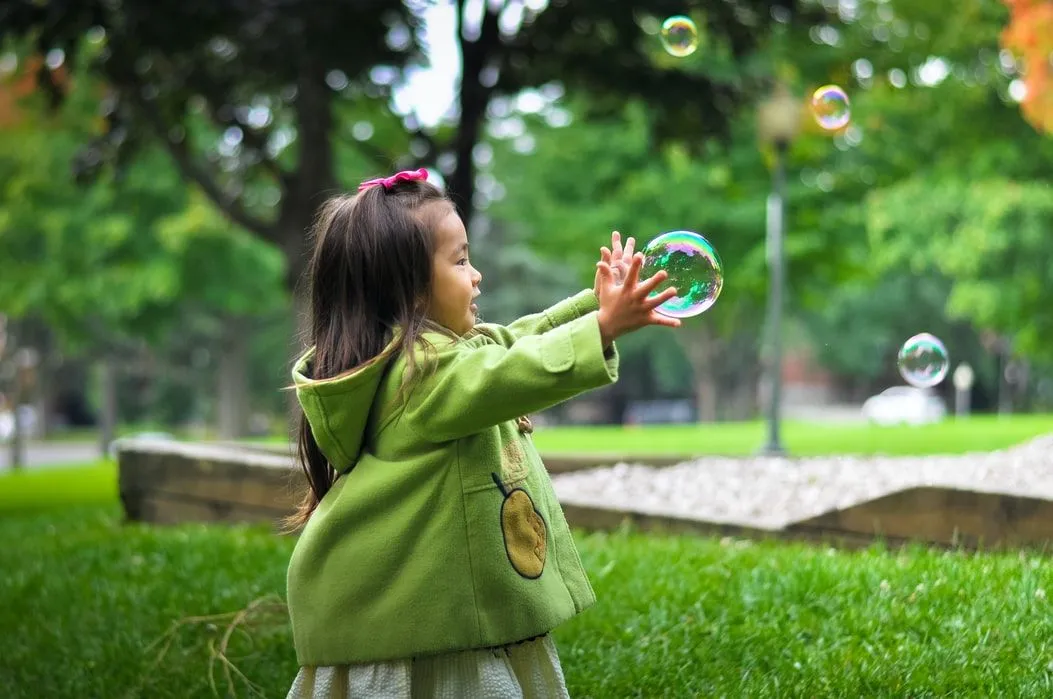FOR ALL AGES
There's always one child who starts to potty train unprompted, months before everyone else's kid.
It's easy to brush it aside and tell yourself that your child is normal (they probably are) and will get there when they get there, but what happens when your older child is still wearing their diaper and doesn't seem to have any desire to potty train? When is it time to step in?
Potty training is a difficult task for parents to navigate no matter what, and different children will be ready at completely different times. But parents who are struggling with their older kids still in diapers don't need to worry. We've got some handy tips and tricks to put your worrying mind to rest and get pull-ups out of your shopping cart once and for all.
Have you mastered daytime potty training, but your child still wears a diaper at night? Don't worry about it, we've got all the info you need in this article.

Every child is different when it comes to the right potty training age. Anything between the age of 18 and 30 months is relatively normal, but for some children, they might be as old as four before they start showing signs of being ready to potty train. By the age of five most kids should be potty trained.
For some reason, girls are usually quicker to progress to toddlers' training pants and pull-up diapers, so quite often it's boys who end up being slower at potty training. So if you're comparing your little boy to the girls in his toddler group, try not to worry too much, it might just be a little later that he's ready to take the plunge.
Potty training is the kind of thing that really does rely on your child's developmental readiness, so if your child isn't showing any interest in their potty, or asking for you to change their diaper, it's going to be a lot harder for you to get them potty trained than if they're taking an interest in what goes on in the bathroom. When kids start staying dry for two hours or longer at a time, it might be a sign that their body is ready, even if they aren't quite there yet mentally, so if you're keen to start, it could be the time.
As parents and caregivers, it might be surprising to learn that you might also be playing a significant role in keeping your child in diapers longer than necessary. If diapers are easily accessible and you aren't mentioning potty training at all, then a child who likes wearing their diaper might not make the jump to training pants as quickly as they would without your encouragement. It might just be a case of starting to talk to them about potty training because they are likely just preoccupied with normal toddler things and not thinking about it at all.
Every child is different when it comes to the right potty training age. Anything between the age of 18 and 30 months is relatively normal, but for some children, they might be as old as four before they start showing signs of being ready to potty train. By the age of five most kids should be potty trained.
For some reason, girls are usually quicker to progress to toddlers' training pants and pull-up diapers, so quite often it's boys who end up being slower at potty training. So if you're comparing your little boy to the girls in his toddler group, try not to worry too much, it might just be a little later that he's ready to take the plunge.
Potty training is the kind of thing that really does rely on your child's developmental readiness, so if your child isn't showing any interest in their potty, or asking for you to change their diaper, it's going to be a lot harder for you to get them potty trained than if they're taking an interest in what goes on in the bathroom. When kids start staying dry for two hours or longer at a time, it might be a sign that their body is ready, even if they aren't quite there yet mentally, so if you're keen to start, it could be the time.
This isn’t unusual, and many parents have experienced it. When it comes to potty training, it can last well beyond the years when we expect it to be done, such as preschool and kindergarten, and sometimes much longer. Diapers can be required for much longer than you may have initially anticipated for children with physical and cognitive disabilities.
Sick children and kids who are under stress due to a major change in their lives may find potty training trickier to handle. These are large, difficult developmental milestones and ultimately, some children just need more time to get to grips with it! There also may be something that isn’t clicking for them about understanding the physiological cues they're experiencing that are telling them they need to go to the restroom. It's worth consulting your physician to rule out any medical factors for the delayed potty training.
If your kid still needs diapers, you can do a few things to assist them with the toilet training process. Talk to them about using the toilet daily; ask them about any anxieties or fears and how they might become more comfortable with the procedure. Setting a toilet timer for different times throughout the day that signals that it's time to go to the bathroom may help.
If you believe your kid is ready to stop wearing diapers, put them away where your youngster cannot see or reach them. While using disposable training pants, attempt to keep up a schedule. The instant your child wakes up, make them use the toilet and put on underpants.
Evaluate your methods and change them if it isn't working. Above all, remember that they are trying, and be supportive.
It's critical to remember that this may be a difficult situation for your youngster, so you want to have a positive and encouraging attitude at all times. Do not embarrass your child by punishing them or comparing them to other children who do not require diapers. When your child refuses to use the restroom or has an accident during the day, be patient with them.
Don't compare. Every child is different, and it's important not to compare your child that's still wearing diapers to the actions of their older siblings, cousins, or friends of the same age. Keep in mind that kids develop at different ages, and just because your child is a couple of months (or even years) older than you'd hoped they'd be out of diapers, ask yourself if this is actually a major problem in the grand scheme of things.
If your child is experiencing difficulty with potty training, you may want to consult your pediatrician, specifically if they haven't managed daytime toilet training by the time they're four years old. Any of the symptoms listed below could indicate an underlying problem that your pediatrician can address.
There could be a medical reason for older kids staying in diapers, like frequent urinary tract infections, painful constipation, or a small bladder capacity, and it's best to get medical help to give your child what they need to be ready to start potty training.

Every child is different when it comes to getting potty trained, and the age that they are ready to stop wearing diapers is going to vary depending on a lot of different factors. It is usually nothing you need to worry about.
In general, if you aren't seeing any signs of them being developmentally ready to start potty training at three years old, you might want to think about your next steps. If your child is potty trained in the daytime, but struggling not to wet the bed occasionally when they're seven or eight, that's totally normal too. According to the AAP, up to 10% of children do this.
If your kid is showing absolutely no signs of wanting to stop wearing diapers whatsoever, then you might want to look at other things happening in their life that could be impacting them. Significant life changes like moving house, getting a new sibling, or parents breaking up can prompt older children to want to wear diapers for longer because they are looking for comfort. There might be some emotional barriers that are stopping older children from letting go of their diapers, so it's important to review any significant life changes and try to work out if there is a deeper root of the problem at hand.
If you've tried everything to get your child to go to the bathroom, but they are still in diapers and are showing no signs of letting go any time soon, it might be time to visit your pediatrician and get some medical help.
If you feel like your older children wearing diapers is just never going to stop, and you're stuck on what to do next to help your kid, then these tips for kids who are a bit more stubborn about potty training might just be what you need.
Read The Disclaimer
At Kidadl we pride ourselves on offering families original ideas to make the most of time spent together at home or out and about, wherever you are in the world. We strive to recommend the very best things that are suggested by our community and are things we would do ourselves - our aim is to be the trusted friend to parents.
We try our very best, but cannot guarantee perfection. We will always aim to give you accurate information at the date of publication - however, information does change, so it’s important you do your own research, double-check and make the decision that is right for your family.
Kidadl provides inspiration to entertain and educate your children. We recognise that not all activities and ideas are appropriate and suitable for all children and families or in all circumstances. Our recommended activities are based on age but these are a guide. We recommend that these ideas are used as inspiration, that ideas are undertaken with appropriate adult supervision, and that each adult uses their own discretion and knowledge of their children to consider the safety and suitability.
Kidadl cannot accept liability for the execution of these ideas, and parental supervision is advised at all times, as safety is paramount. Anyone using the information provided by Kidadl does so at their own risk and we can not accept liability if things go wrong.
Kidadl is independent and to make our service free to you the reader we are supported by advertising.
We hope you love our recommendations for products and services! What we suggest is selected independently by the Kidadl team. If you purchase using the buy now button we may earn a small commission. This does not influence our choices. Please note: prices are correct and items are available at the time the article was published.
Kidadl has a number of affiliate partners that we work with including Amazon. Please note that Kidadl is a participant in the Amazon Services LLC Associates Program, an affiliate advertising program designed to provide a means for sites to earn advertising fees by advertising and linking to amazon.
We also link to other websites, but are not responsible for their content.
Was this article helpful?



We’ll send you tons of inspiration to help you find a hidden gem in your local area or plan a big day out.



Check your inbox for your latest news from us. You have subscribed to:
Remember that you can always manage your preferences or unsubscribe through the link at the foot of each newsletter.